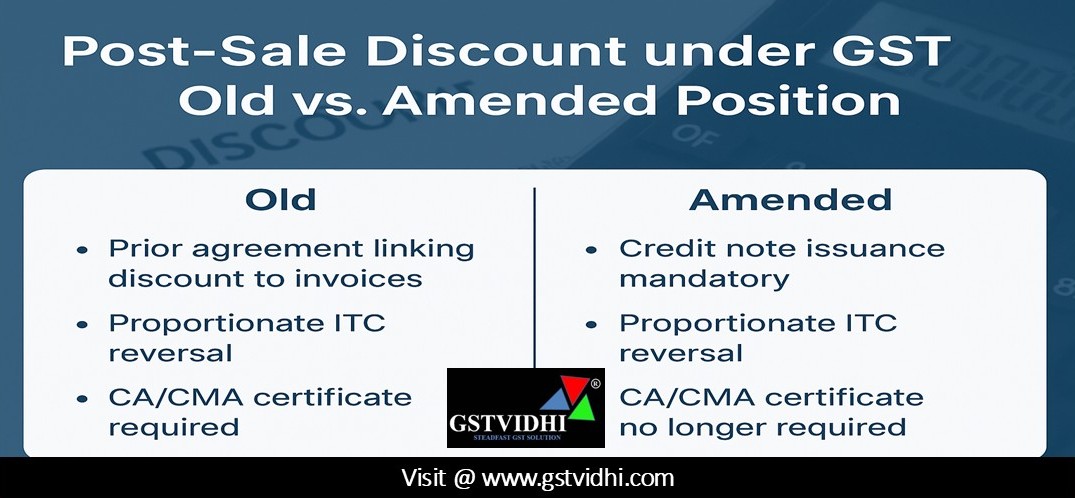
Post Sale Discount under GST – Old vs. Amended Position
Introduction
Post-sale discounts are a
common business practice where suppliers offer incentives to buyers after the
supply of goods or services has been completed. Under the Goods and Services
Tax (GST) regime, the treatment of such discounts has always been a matter of
concern due to its direct impact on the value of taxable supply, issuance of
credit notes, and reversal of Input Tax Credit (ITC). Over the years, several
disputes and compliance challenges have arisen, prompting the government to
issue clarifications and subsequently amend the law. The recent recommendations
of the GST Council in September 2025 mark a significant shift in how post-sale
discounts are treated under GST.
Earlier
Legal Framework
Section 15(3)(b) of the
CGST Act, 2017 provided that post-sale discounts shall be excluded from the
value of supply only if:
1. The
discount was agreed upon in terms of a prior agreement (entered into at or
before the time of supply).
2. The
discount was specifically linked to relevant invoices.
3. The
recipient reversed the proportionate ITC attributable to such discounts.
To operationalize these
conditions, the CBIC issued Circular No. 212/6/2024-GST dated 26th June 2024.
The circular mandated suppliers to obtain proof from recipients that ITC had
been reversed. For discounts exceeding ₹5 lakh in a financial year, a certificate
from a Chartered Accountant (CA) or Cost Accountant (CMA) was required. For
smaller amounts, an undertaking from the recipient was sufficient.
This framework, though
legally precise, placed an additional compliance burden on businesses.
Suppliers often faced practical difficulties in obtaining timely
certifications, while recipients hesitated to reverse ITC, leading to disputes
and litigations.
Amendment
in Post Sale Discount Provisions
Recognizing the
hardships, the 56th GST Council Meeting held on 3rd September 2025
recommended key changes:
- Omission of Section 15(3)(b)(i):
The requirement of a prior agreement linking discounts to invoices has
been removed. This simplifies documentation and acknowledges that many
commercial discounts are dynamic and not predetermined.
- Amendment of Section 15(3)(b) and
Section 34: The law now provides that post-sale
discounts should be granted strictly through a GST credit note
issued under Section 34. Correspondingly, Section 34 has been amended to
explicitly cover discounts under Section 15(3)(b).
- Reversal of ITC:
ITC reversal by the recipient continues to be mandatory whenever value of
supply is reduced through a GST credit note.
- Rescission of Circular 212/6/2024:
Since the requirement of CA/CMA certification created compliance
bottlenecks, the circular stands withdrawn. Instead, the amended law
itself ensures clarity and uniformity.
Practical
Impact of the Change
1. Simplified
Compliance: Businesses no longer need to rely on
CA/CMA certificates for ITC reversal, thereby reducing cost and administrative
burden.
2. Certainty
in Transactions: Removal of the “prior agreement”
condition provides relief to suppliers, especially in industries where
discounts are offered on seasonal or volume-based performance.
3. Reduced
Litigation: Clear legislative backing replaces
interpretational circulars, minimizing scope for disputes between taxpayers and
authorities.
4. Continuing
ITC Safeguard: The requirement of ITC reversal ensures
that both supplier and recipient maintain tax neutrality, preventing revenue
leakage.
5. Industry
Benefit: Sectors like FMCG, automobiles, and electronics,
where post-sale discounts are prevalent, will experience smoother business
operations.
Conclusion
The treatment of
post-sale discounts under GST has undergone a major transformation. Earlier,
compliance was heavily documentation-driven, relying on CA/CMA certificates and
prior agreements. With the latest amendment, the law has been simplified:
discounts granted through credit notes can reduce taxable value, subject only
to reversal of ITC by the recipient. This change strikes a balance between
trade facilitation and revenue protection.
The amendment is a
welcome move as it reduces compliance complexities, aligns GST provisions with
commercial realities, and provides much-needed clarity to taxpayers. Businesses
should now focus on timely issuance of GST credit notes and ensuring proper ITC
reversal documentation to remain compliant in the new regime.
Disclaimer: All the Information is based on the notification, circular advisory and order issued by the Govt. authority and judgement delivered by the court or the authority information is strictly for educational purposes and on the basis of our best understanding of laws & not binding on anyone.
Click here